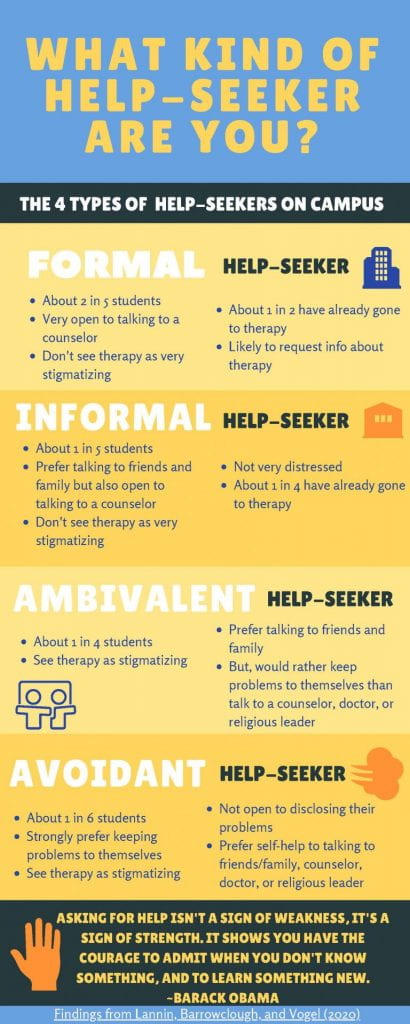Seeking help is a difficult thing for many people. Here are some of the ways that stigma can affect decisions to seek help, and experiences when getting help:
- Structural Stigma. The institutions in a society have rules, policies, and procedures that can restrict the rights of people with mental health concerns, and this can reduce their opportunities for living a full and fruitful life (Corrigan, 2004). Governmental agencies, schools, community groups, and private companies may have policies that make things more difficult for people with mental health concerns. For example, medical students often experience mental health concerns while completing their demanding programs, but they may experience discrimination if they disclose their mental health concerns while applying for residency programs (Aggarwal et al., 2020).
- Public Stigma. The broader public views having a mental illness (and/or needing psychological help) as shameful (Corrigan, 2001). This can be problematic. A person might be discriminated against if it is found out they have a mental illness or are seeking psychological help. Additionally, awareness of broader stigmatization from society may prompt a person to hide their mental illness and avoid seeking help.
- Self-Stigma. When a person begins to believe society’s stigmatizing beliefs about mental illness and seeking psychological help–it can be especially detrimental. Now, a person is not only aware of negative stereotypes and beliefs about mental illness and psychological help-seeking, but they believe those ideas and apply them to themselves (Vogel et al., 2006). For example, they might believe things like, “I am shameful because I have a mental health concern and need psychological help.” A person might feel demoralized and experience an effect called the “why try” effect (Corrigan et al., 2016), and they might avoid seeking the very type of help that can address their mental health concerns (Lannin & Bible, 2022).
- Perceived Provider Stigma. Sometimes mental health providers can subtly or not-so-subtly put down their clients and disempower those who are trying to address mental health concerns (Wang, 2018). Unfortunately, their clients often pick up on it. Clients can believe that their provider stigmatizes their condition and views them as shameful. Obviously, this has negative effects on their experiences with that mental health care provider.
Things that Affect Stigma
There is a lot of research that looks at things that influence stigma. Below are just a few that I have investigated with colleagues.
Personal Values. People may tend to prioritize certain principles in their life, and the principles that are most important to them may influence how they view mental health concerns and psychological help (Lannin et al., 2020). For example, a person who is oriented toward materialistic values (such as wealth, social status, and prestige) is more likely to view having a mental health concern and seeking help as stigmatizing (Lannin et al., 2019).
Masculinity. Men tend to stigmatize mental health concerns and psychological help more than women, but it’s not always so simple. Regardless of a person’s identified gender, those who tend to believe that they should “act like a man” also tend to believe that therapy is more stigmatizing (Heath et al., 2017). These beliefs about how a person should act are called masculine gender norms and include believing that people should be self-reliant, put work first, present in a heterosexual manner, etc. (Addis & Mahalik, 2003).
Self-Compassion/Self-Coldness. People talk to themselves–sometimes out loud, and sometimes the voice is more internal. And, these voices can be kind or harsh. Self-compassion refers to when a person is kind to themselves, and self-coldness refers to when a person is more critical and harsh (Brenner et al., 2017). It turns out these internal voices matter, and the more self-compassionate (and less cold) a person is–the better it is for their mental health and tendency to self-stigmatize (Heath et al., 2018).
Different Types of Help-Seekers
Recently, I teamed up with a couple researchers to see whether there were specific “profiles” of different types of help-seekers here on campus at Illinois State University.
Below is a little infographic that sums up the main things we found.
